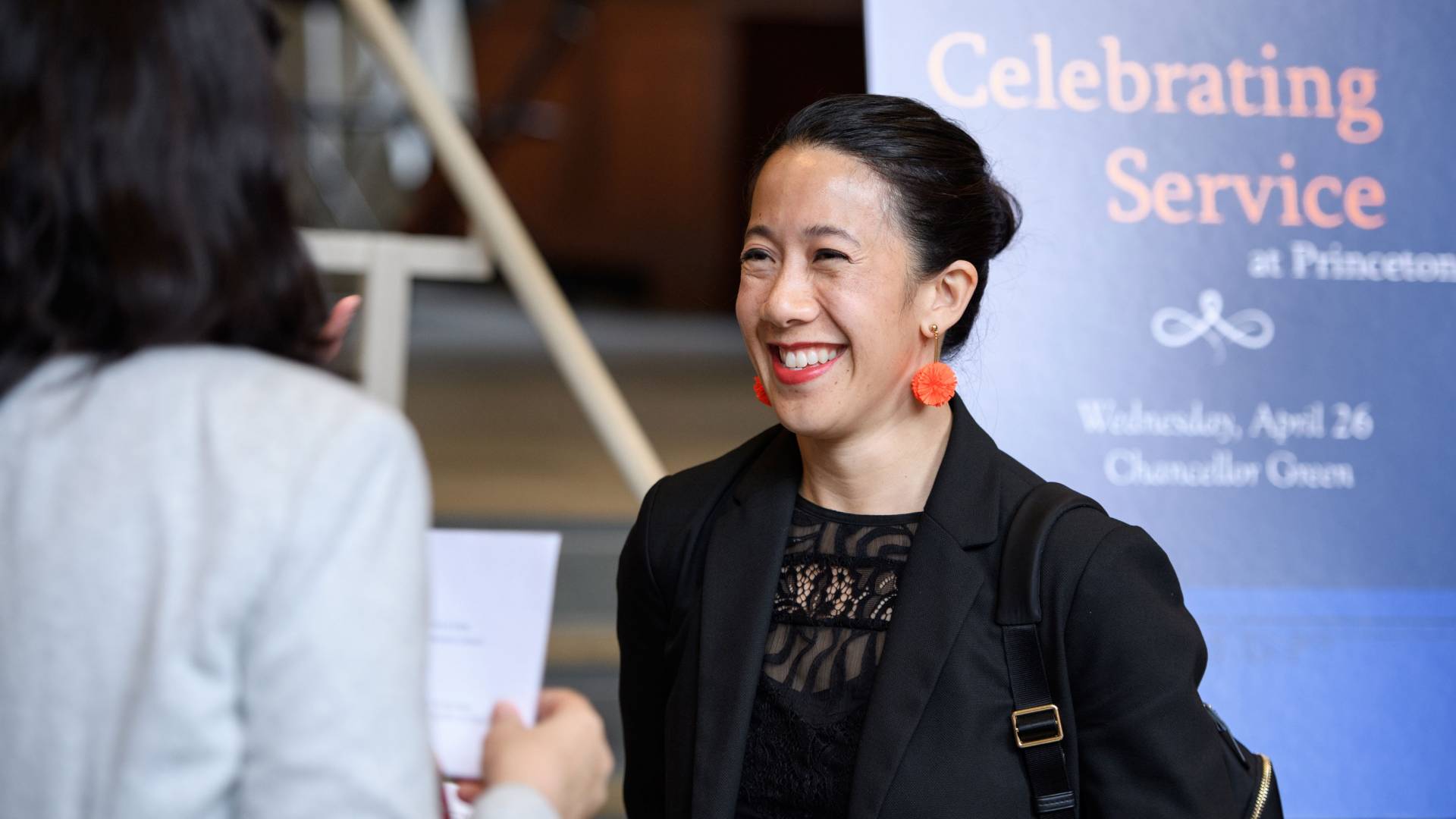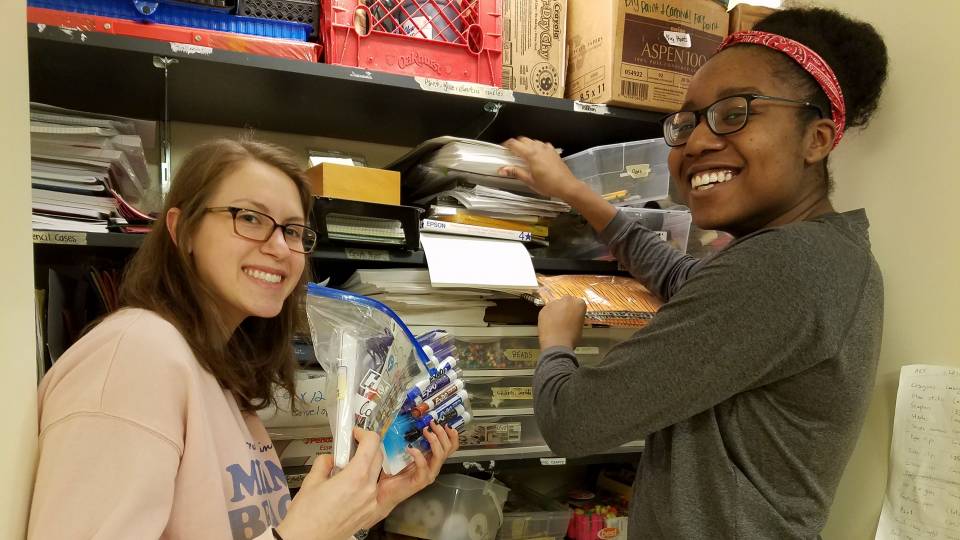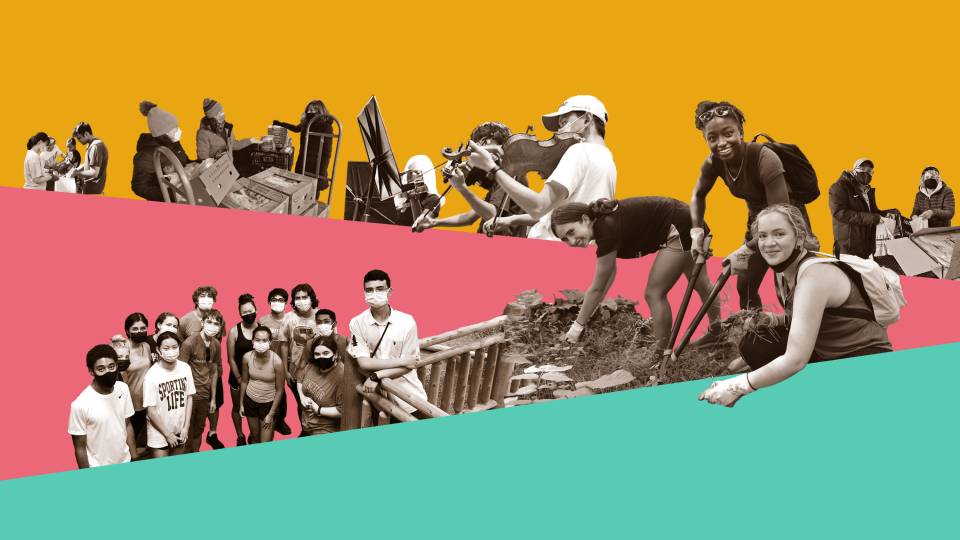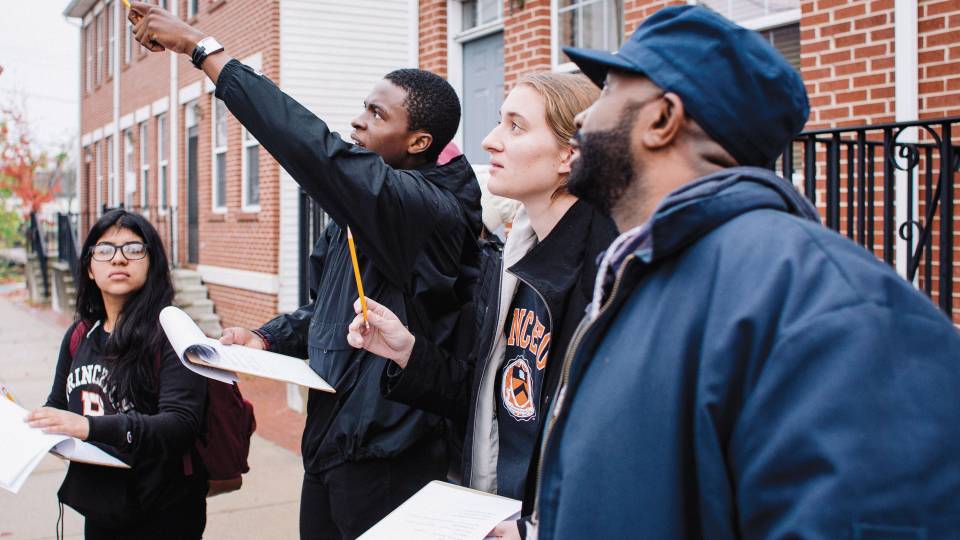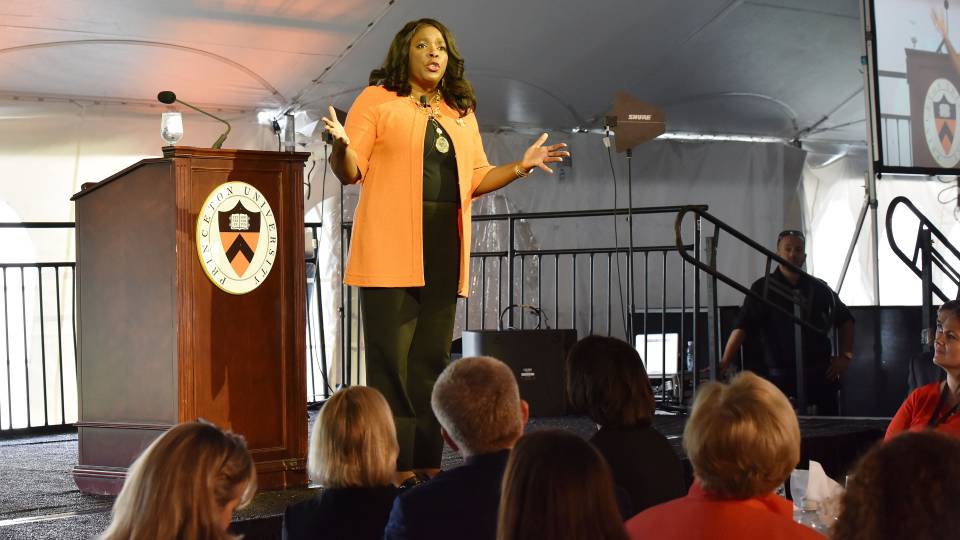Kimberly de los Santos, the John C. Bogle '51 and Burton G. Malkiel *64 Executive Director of the Pace Center for Civic Engagement and co-director of the Princeton University Service and Civic Engagement Steering Committee, welcomes attendees.
More than 300 members of the Princeton University and local communities joined together Wednesday, April 26, for Celebrating Service at Princeton. This inaugural event was organized by the University's Service and Civic Engagement Steering Committee to honor the service and civic engagement endeavors of Princeton faculty, undergraduate students, graduate students, staff and community partners.
"I serve because it makes me happy," said Andres Castillo Quintana, a junior studying psychology who is part of Princeton Latinos y Amigos and who has collaborated with like-minded student groups including the Princeton DREAM Team to mentor and help area high school students navigate the college application process.
"I am part of the community I serve. I am low-income, first-generation, and moved to the United States when I was 3," he added. "The issues I work with on a community basis, I deal with personally too. I've come to realize that while I want to help everyone, I can't, and yet still touching one life is important. That person can go on to help others and it starts to ripple outwards. I've learned that you can make a difference for your community one person at a time."
The event began with six simultaneous roundtable panel discussions designed to illuminate the broad nature of service at Princeton and the deep connections between learning and service at the University. Afterward, attendees gathered in Chancellor Green Rotunda to celebrate service as a core value of what it means to be a Princetonian.
Around the table
In the panel discussions, faculty, students, staff, alumni and community partners made connections with one another — not necessarily in the specific service they engage in, but in the shared values and motivations for being involved.
"I think we all feel called to connect with others," said Fay Reiter, director of social services with Princeton Community Housing. She pointed to how the Princeton men's football team has helped annually with their community garden as part of efforts organized by the Princeton Varsity Club and the Office of Community and Regional Affairs. "The important thing is to nurture our need to help others in our own ways. We don't need to make a whole career in it, but if everyone spent some time serving, they'd get so much back."
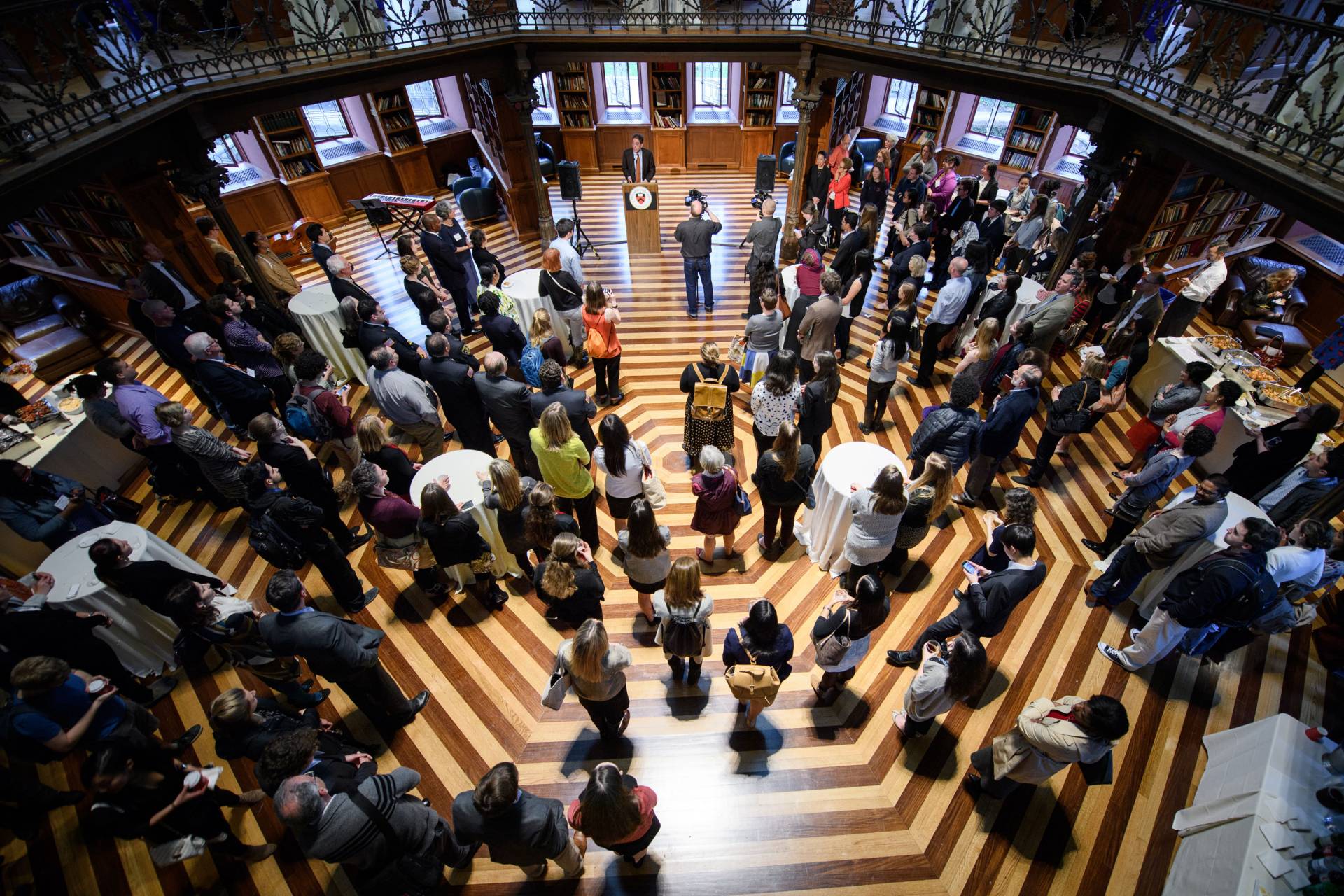
More than 300 members of the Princeton University and local communities joined together for Celebrating Service at Princeton. This inaugural event was organized by the University's Service and Civic Engagement Steering Committee to honor the service and civic engagement endeavors of Princeton faculty, undergraduate students, graduate students, staff and community partners. Above, at the podium, Princeton President Christopher L. Eisgruber addresses the attendees in Chancellor Green Rotunda.
Paloma Moscardo-Valles, a lecturer in the Department of Spanish and Portuguese, and Karen Emmerich, an assistant professor in comparative literature, shared examples of how service can yield unique learning moments to enhance work in the classroom or in life.
For Moscardo-Valles, bringing medical students to teach about nutrition and diabetes, as well as English as a second language, to communities in Trenton and Princeton, bolsters the learning experience and is worthwhile despite the logistical challenges of adding a community component to her course material.
Emmerich cited collaboration as a key ingredient for making service part of the Princeton experience. After working for a month in a refugee camp in northern Greece near the Macedonian border in 2016, she began looking for a way to bring students with her to serve again — not as part of a class, or an internship, or a campus organization — but purely to serve. In partnership with Kimberly de los Santos, the John C. Bogle '51 and Burton G. Malkiel *64 Executive Director of the Pace Center for Civic Engagement, and Anastasia Obydenkova, a visiting research scholar at the Princeton Institute for International and Regional Studies, she was able to make it happen.
During summer 2016, seven undergraduates and one graduate student traveled with Emmerich to Greece to work with refugees and support local organizations. During winter break in January this year, the students returned with her to serve again.
"The willingness of these Princeton administrators to do something that I was told wasn't necessarily 'a Princeton thing to do' was more than heartening," Emmerich said. "As Anastasia said, 'If we don't change Princeton, who's going to?'"
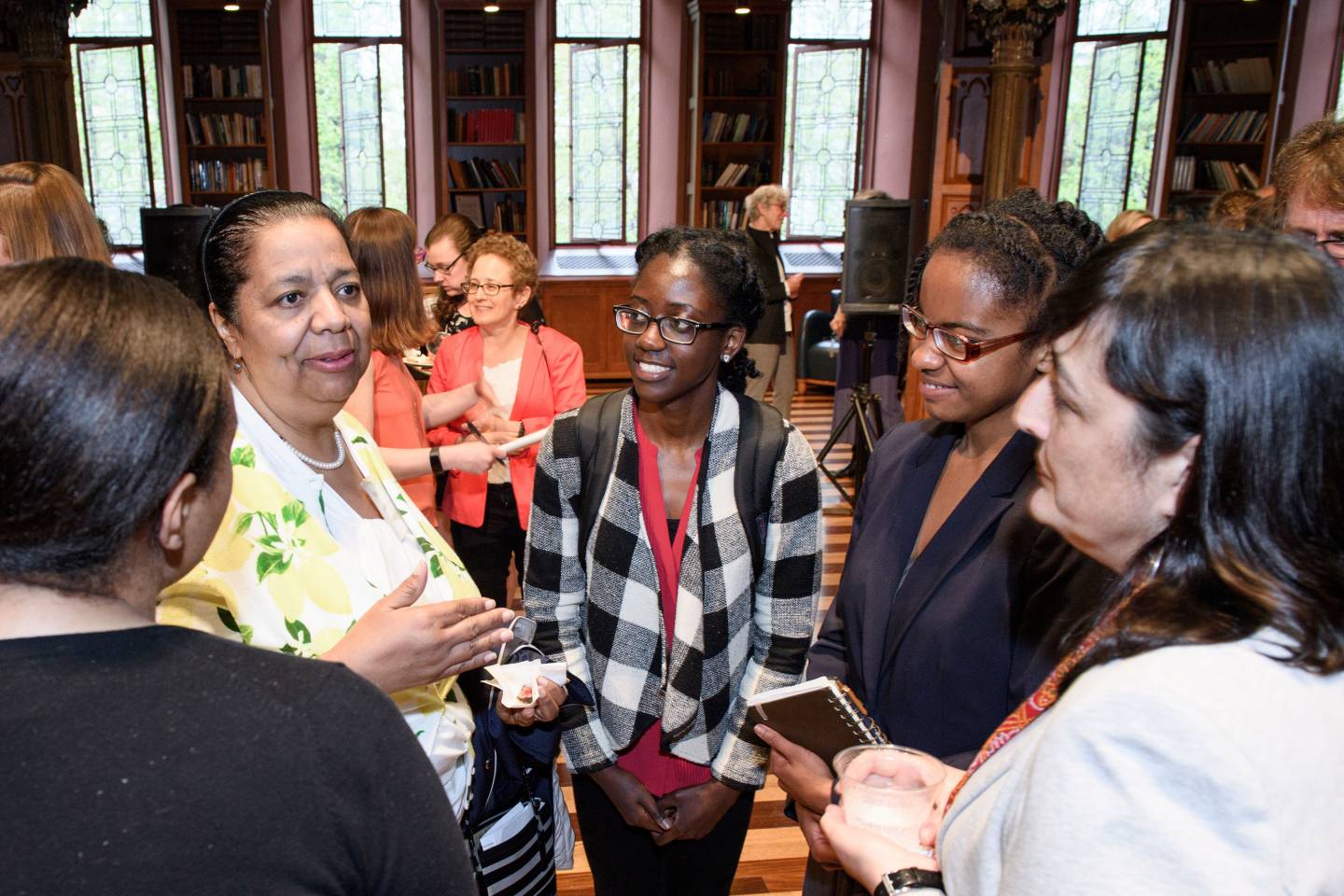
Event participants had the opportunity to learn about each other's work and service experiences. Above left, Wendy Cotton, executive director of Princeton Nursery School, connects with Princeton students and staff.
Commitment to service
Princeton's strategic planning framework identifies key goals and major priorities for the University. As part of the strategic planning process, the University asked a series of key questions, including: What must we do to make service central to the mission of the University? The Service and Civic Engagement Steering Committee, an advisory body of faculty, staff and University leaders, has been charged with bringing recommendations answering that question to life.
Before a crowd filling the Chancellor Green Rotunda and balconies above, Princeton University President Christopher L. Eisgruber thanked the steering committee for its work, and shared particular gratitude for its co-directors de los Santos and Melissa Lane, the Class of 1943 Professor of Politics and director of the University Center for Human Values, who will be stepping back from her leadership role on the committee to continue as a member.
"Together with Kimberly, Melissa has helped guide an important process of reflection on how we do service here at Princeton and what we can do to make service a central part of the University's mission," he said. "Her work has led to concrete recommendations for integrating service with academic coursework, developing new metrics for evaluating service experiences, and expanding the scope of service opportunities to include new campus and community partners."
Eisgruber reiterated his strong belief in the importance of service at Princeton University.
"I firmly feel this University's commitment to service is one of the defining features of our mission," he said. "It is encapsulated in our informal motto, 'Princeton in the nation's service and the service of humanity.' Our official mission statement approved by the trustees a little more than a year ago, recognizes this University's pervasive commitment to serve the nation and the world.
"Our researching and teaching in my view is itself a very important part of that service mission," he continued. "Part of the way we serve is through teaching and research of unsurpassed quality. But I also regard it as essential for every person on this campus to be thinking about how they will give back to the world. In my view you can give back to the world in just about any profession you choose to take up. It's not a matter of which profession you take up, but it is a question of how you go about pursuing that profession."
He also highlighted the evening's panel conversations as examples of why it's critical to be conscious and think about what it means, not just to do a job well, but to do it in a way that gives back and makes a difference.
"Those of you who gathered here today, have chosen to serve in countless ways," he said. "Thank you for the spirit that you show and thank you for all the things you're doing to make a difference in the world. It's inspiring to me and it makes a difference to who we are as a university."
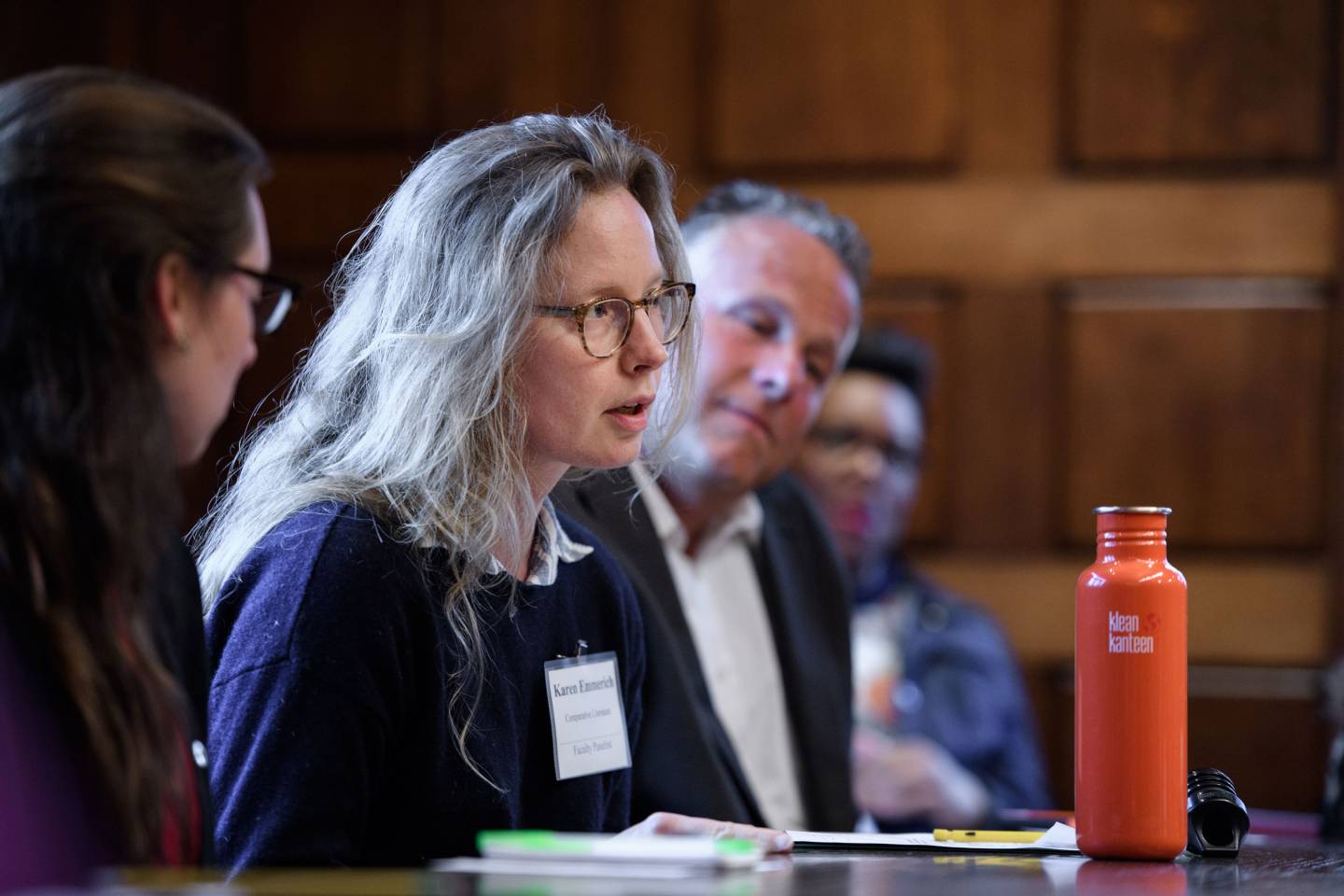
In one of the panel conversations at the start of the event, Karen Emmerich, an assistant professor of comparative literature, spoke of how service can yield unique learning moments as she shared how she traveled with students to Greece to work with refugees.
Learning and service
In her remarks, Jill Dolan, dean of the college, the Annan Professor in English and a professor of theater in the Lewis Center for the Arts, shared ways in which the University is bringing service more directly into its curriculum, such as exploring the idea of adding "service tags" to courses to highlight those with service components.
"Service is as much about learning as it is about contributing and we're looking forward to infusing that into our curriculum," said Dolan. "I truly believe our classrooms are places where we can rehearse democracy. Where we teach our students the true art of civic dialogue, of respectful engagement and of empathy across difference of all sorts. Our service curriculum … will give our students a chance to experiment with what it truly means to be a global citizen."
Dolan recently traveled to Senegal to visit with the University's Bridge Year Program, which allows a select number of incoming Princeton students to engage in nine months of University-sponsored service at one of five international locations, and called out this experience as one that reinforces the significance of connecting service and learning at Princeton.
"I have to say that seeing for myself how the Bridge Year students in Senegal spend their time on a really granular level clarified for me why these programs are so transformative," she said. "I think many of our service projects fit in the transformative realm."
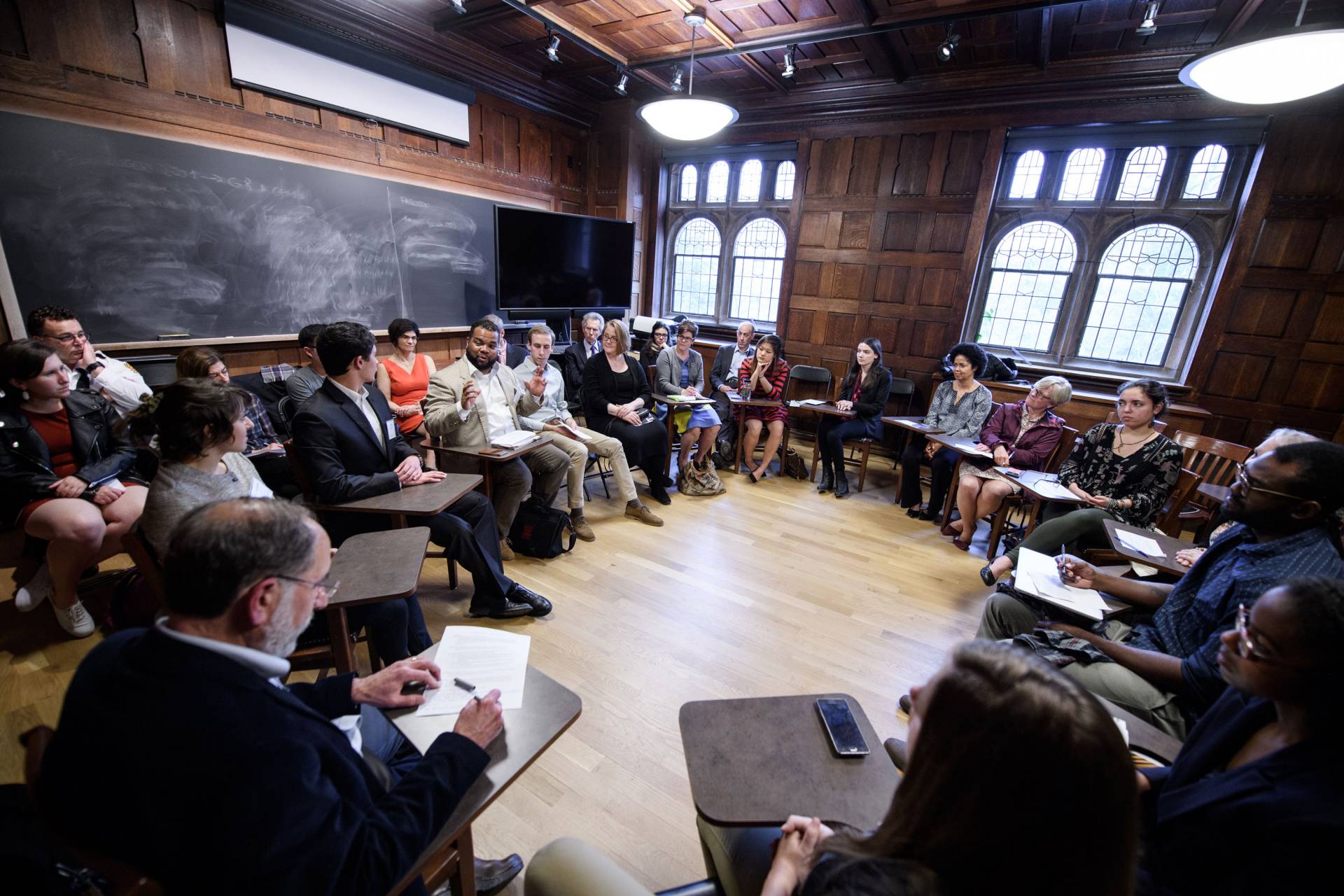
The inaugural event began with six simultaneous roundtable panel discussions where faculty, students, staff, alumni and community partners joined together to reflect on why they serve, how they collaborate and what they learn from service.
Heather Howard, director of the State Health Reform Assistance Network with the Woodrow Wilson School of Public and International Affairs, lecturer in public affairs with the Wilson School, and councilwoman for the town of Princeton, agreed with Dolan's sentiments.
This year she taught one of the University's first freshman seminars focused on service and civic engagement. Through the Community-Based Learning Initiative, she partnered with the Trenton Health Team, a collaborative organization that focuses on transforming health care in Trenton, to work on a series of projects that get at the root causes of ill health.
"The students got to study the academic literature on the social determinations of health and then got to go to Trenton and see it play out on the sidewalks of the city," she said, sharing how students geo-mapped homes with high lead levels, examined city legislation to raise the age to purchase tobacco products to 21, looked at ways to complete street and sidewalk repairs, and worked on a program to prevent food waste.
"It was exciting to bridge this area of burgeoning academic work on understanding the broader influences of health with the chance to broaden students' views of the issue by engaging in a community where it's become real," she added.
Service as common ground
Attendees were not only grateful for the opportunity to come together to celebrate service, but also shared how doing so opened their eyes to the real impacts and extended ways people at Princeton participate in service.
Kyle Rendall, deputy chief of the Princeton Fire Department, expressed gratitude for the University's partnership and support. "Our fire department is 100 percent volunteer," he said as he described how Princeton University's employee volunteer firefighter program and the Princeton Student Firefighters Association, a Pace Center for Civic Engagement student group, are vital to the department. "We rely on employers to be flexible enough to let their employees respond when they get the call. Princeton's support shows it's a true partner in the success of the town."
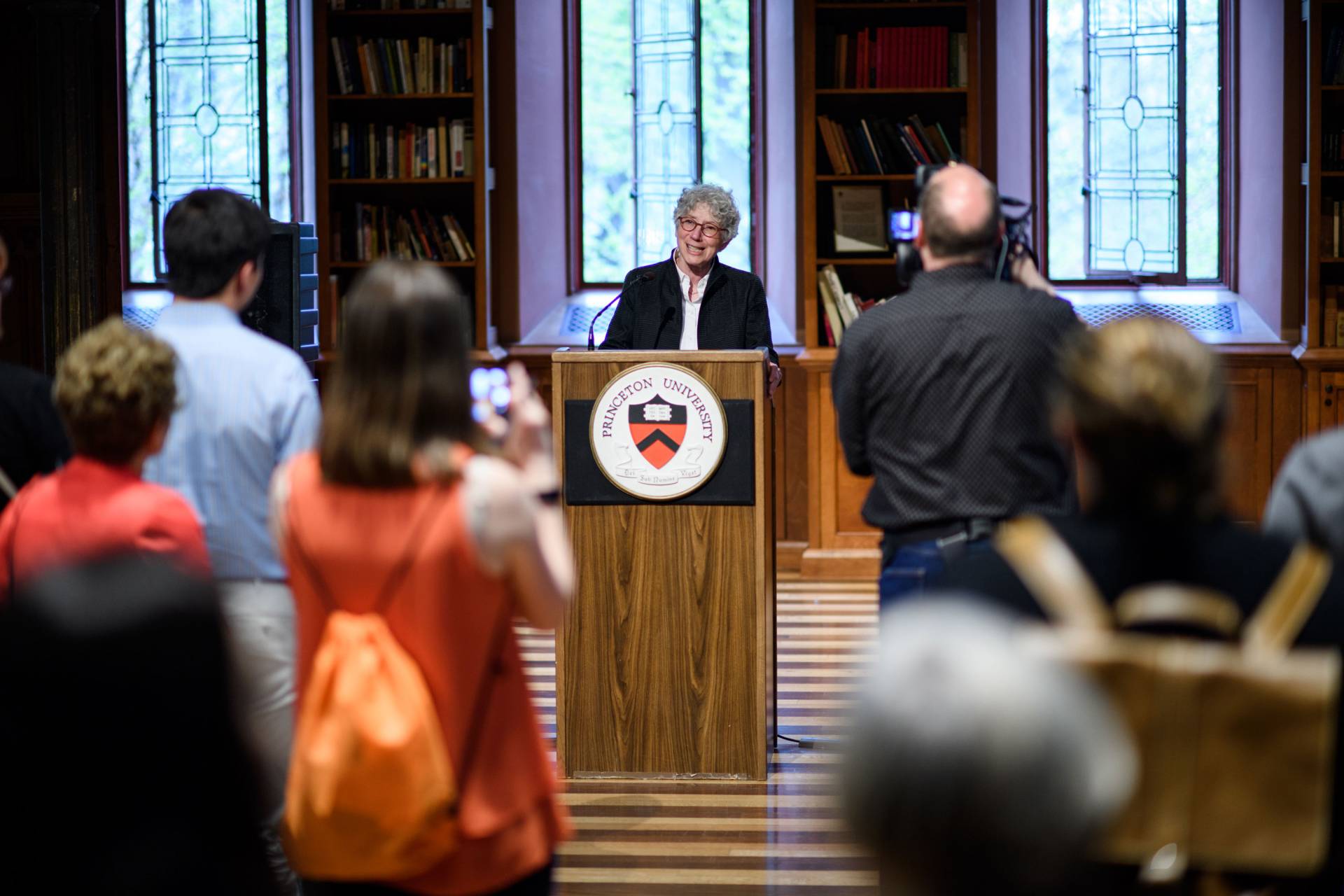
In her remarks, Jill Dolan, dean of the college and the Annan Professor in English and a professor of theater in the Lewis Center for the Arts, shared ways in which the University is bringing service more directly into its curriculum and reinforced service as an important part of students' education toward becoming "global citizens."
Wendy Cotton, executive director of Princeton Nursery School, agreed. "We are so fortunate to have such great, energetic young people coming to work with us," she said. "To hear the University president say that service is important, that it's important for staff and students to give back to the community and that the University wants students to extend this work after they graduate, is so inspiring."
Jean Czarkowski, a school counselor with Old Bridge Public Schools, appreciated the opportunity to connect with such a wide swath of the campus community.
"As a career social worker and a school counselor, I often am exposed to the overwhelming needs within our society that have little to no resources to draw upon," she said. "[This event] reminded me that when motivated individuals come together, share their strengths and collaborate, our society benefits in ways that are immeasurable."
"For me it was really cool to hear all the different projects going on," said Natalie Fahlberg, a junior from Maclean, Virginia, in Army ROTC. "In our conversation I learned about so many unexpected things that people are doing, like using artificial intelligence to predict mental health issues. It can be really easy to stay focused on your own area, but it was eye-opening to learn about the efforts of others and how it's all service."
Rochelle Calhoun, vice president for campus life, appreciated the thoughtful way the event brought people together.
"What has been so impressive to me about tonight is the deep sense of mutuality amongst everyone who has come together through service," she said. "I loved how someone in our group expressed it isn't about serving for someone or upon them, but with them."
"Service at Princeton is about impacting the world, each one of us, and all of us together," de los Santos said. "It's about learning from one another, observing, listening, caring, being there for one another — 'one person and one act at a time,' as Justice Sonia Sotomayor has said."
Celebrating Service at Princeton was co-sponsored by the Community-based Learning Initiative, Office of Community and Regional Affairs and the Pace Center for Civic Engagement.
